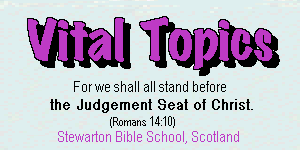

The Oxford Dictionary defines the word God as follows:
God: The Creator and Ruler of the universe in Christian,
Jewish and Muslim teaching ...
That is what the English speaking world means when it uses the word
God; and that is what we in the Stewarton Bible School mean when we
use the word. Anyone who assumes that when English-speaking people say
God they mean a pagan idol is out of touch with the English
language. In our article, Sacred Names ...
Part 1 you will see that we are fully aware that the Almighty's name is
Jehovah or Yahweh, After you read that article do remember
what the Saviour said about identifying true believers: "You shall
know them by their fruit."
| Zephaniah 3: | 8: Therefore wait ye upon me, saith the LORD, until the day that
I rise up to the prey: for my determination is to gather the nations,
that I may assemble the kingdoms, to pour upon them mine indignation,
even all my fierce anger: for all the earth shall be devoured with the
fire of my jealousy. 9: For then will I turn to the people a pure language, that they may all call upon the name of the LORD, to serve him with one consent. |
| Exodus 34: | 1: And the LORD said unto Moses, Hew thee two tables of stone like unto the first: and I will write upon these tables the words that were in the first tables, which thou brakest. 2: And be ready in the morning, and come up in the morning unto mount Sinai, and present thyself there to me in the top of the mount. 3: And no man shall come up with thee, neither let any man be seen throughout all the mount; neither let the flocks nor herds feed before that mount. 4: And he hewed two tables of stone like unto the first; and Moses rose up early in the morning, and went up unto mount Sinai, as the LORD had commanded him, and took in his hand the two tables of stone. 5: And the LORD descended in the cloud, and stood with him there, and proclaimed the name of the LORD. 6: And the LORD passed by before him, and proclaimed, The LORD, The LORD God, merciful and gracious, longsuffering, and abundant in goodness and truth, 7: Keeping mercy for thousands, forgiving iniquity and transgression and sin, and that will by no means clear the guilty; visiting the iniquity of the fathers upon the children, and upon the children's children, unto the third and to the fourth generation. 8: And Moses made haste, and bowed his head toward the earth, and worshipped. |
| Exodus 34: | 14: For thou shalt worship no other god: for the LORD, whose name is Jealous, is a jealous God. |